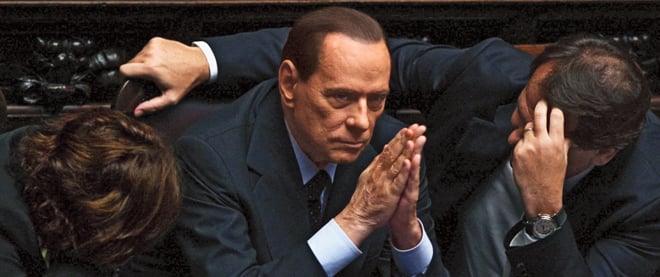Call girls, graft and Italy’s paralysis
New revelations about Berlusconi further erode his image, but no one seems ready to bring him down
Alberto Pizzoli/AFP/Getty Images
Share

On Sept. 19, Italy had its debt rating slashed by Standard & Poor’s. Three days earlier, the world had learned the country’s leader privately calls himself a “spare-time” prime minister.
The remark, along with several snippets of phone conversations that were never meant to leave Silvio Berlusconi’s inner circle, found its way into national and international headlines when wiretap transcripts tied to an ongoing investigation became public. The controversial excerpts featured the prime minister insulting Germany’s Chancellor Angela Merkel, and boasting about sleeping with eight women in a single night. Most importantly, the tapes revealed that he may have been the object of blackmail by some close associates who used to supply him with prostitutes and aspiring starlets for his parties. The wiretaps also uncovered high-level corruption at Finmeccanica, a state-controlled defence and industry group. Though the inquiry has not lead to charges being laid against Berlusconi so far, it represents the fifth judicial proceeding the prime minister is embroiled in, on top of four court cases where he is defending himself against accusations including corruption, tax fraud and paying for sex with a 17-year-old girl.
The new scandals have come at a time when Berlusconi’s approval ratings were already plumbing unprecedented lows—at around 24 per cent, according to one newspaper poll—and no other political personality or party seems ready to supplant him at the helm. The Italian leadership is coming to resemble a headless chicken, just when the country must pull together to implement a $73-billion austerity package meant to reassure rattled investors that it won’t become insolvent on $2.6 trillion in public debt.
But even as domestic papers fill with gloomy editorials wondering just how much worse things could get, Italy’s leadership and economic crises are combining in a way that seems to be perpetuating the political impasse. On the one hand, Berlusconi’s sinking fortunes make it hard for his centre-right alliance to find a consensus on growth-spurring, liberalizing reforms that the European Union and international investors are demanding. “Berlusconi’s popularity was the raison d’être of the coalition,” says Robert Ventresca, a professor of history at the University of Western Ontario. But recent infighting among the ruling parties, he adds, is a sign that Berlusconi’s allies are trying to distance themselves publicly from a now unloved prime minister. This new animosity within the right, coupled with an already fractious centre-left opposition, has nearly paralyzed a parliament now dominated by centrifugal forces. In a sign of the times, legislators proposed around 13,000 amendments to the austerity budget put forth by the government before they finally approved it two weeks ago. Tellingly, S&P indicated that “policy differences within parliament” were one reason for the rate cut, which analysts widely interpreted as a downgrade of Italy’s politicians.
On the other hand, some Italy-watchers say, fears that political instability would trigger panic among bond-holders is preventing a crisis of government, and keeping the country’s weakened leader in power. Of course, it might also be that virtually all parties, both on the right and left, feel too weak to call for an early election, says Marco Tarchi, a professor of political science at the University of Florence. Nobody wants to go to the ballot box while voters are in such a mutinous mood.
Meanwhile, the squabbling politicians keep alienating the public. The recent chaotic, obscure austerity measures the government insists will eliminate the public deficit by 2013 are the latest reason why Italians feel suspicious and weary, says Michele Ainis, a professor of law at Rome’s Roma Tre University. He calls it a “mega-bill made up of normative confetti,” the product of a weak parliament trying to replenish the state’s coffers while tiptoeing around the special interests of a platoon of lobbies. A proposal to limit the power of professional registries in order to liberalize the job market, for example, was quickly scrapped. It all left people with a suspicion that the burden of austerity has been distributed unequally, something that may reinforce age-old instincts to elude laws perceived to be unfair, says Ainis.
Yet at least some, it seems, are ready for sacrifice. Several of the country’s prominent businessmen have been rallying behind the idea of introducing a wealth tax on the rich that, they say, could reduce the national debt by 20 percentage points. It might be what Ventresca calls “the country’s ability to keep going despite its ruling class.”